”You you you you you you you you, give moneeeeeeeey, give hiiighlaaand!!!”
(an Ethiopian greeting)
After leaving Bahir Dar we were going to experience a real rollercoaster. Mountains intersected by numerous river valleys, culminating at the Blue Nile gorge. Most of the route led around 2000m ASL, making the weather acceptably cool, even despite the fact that the sun was reaching zenith at the noon.
Doing about 70km per day we crossed numerous villages and towns. They all looked so similar, that in my memory they melt into one, long village. The same houses made of mud pressed into wooden lattice, the same shops offering not much more than stale biscuits, soap bars and cheap pens. The same cattle and beggars everywhere. Even though I can hardly tolerate begging, there I had to get used to that. Children just did not stop and adults often joined. But among the young ones there was also a lot of enthusiasm from seeing a farenj. That was the main thing that made difference between villages: in some we were greeted by cheerful children shouting “you, you, you” with wide grins, just to be attacked by a horde demanding money or pens in the next settlement. Sometimes a stone followed, and even though they always missed, the constant vigilance and expectation of an attack was perhaps the most grueling part of cycling in that country.
While we stopped to rest, usually a group of children quickly gathered around us. We tried to speak with them, and sometimes managed to talk about their cattle or school tasks. English is obligatory since the early years of education, and despite the huge deficiencies of schools and teachers’ skills, some kids were able to assemble simple sentences. Unfortunately, the words they had mastered the best were “money” and “give”. Sometimes, by requests like “give frank” we could sense what was the nationality of a dumb moron, who actually gave them something. And the most awkward request was “give highland”. The word, which usually describes a geographical feature, meant the bottled mineral water we used to drink. Even though all the kids used it, when we asked for “highland” in the shops, we received confused looks.
The most unexplainable phenomenon was the sudden change of children’s behavior once we were back on the bikes. The shy, polite and communicable kids instantly exploded with a litany of aggressive requests. We called it “moving mode”, as opposed to the “stopped mode”, while we were sitting or standing and communication was possible. Why there was such a big difference between being on foot and cycling, we never discovered. Perhaps some similarity between a moving bike and walking cow triggered some shepherd’s reflex and switched them to shouting and using sticks and stones?
What is interesting in Ethiopia, that people live a life we could call “healthy” in the west. Before the capital we met no single overweight person (unfortunately underweight is quite common). Most people are fit and seem to love running. Kids herding the cattle run around their flock. Those who attend school, which is often located few villages and a dozen kilometers away, often run there and back home. The adult men, with their slender but muscular legs dressed in shorts, also seemed not to waste time for slow walking. Often they ran carrying quite heavy load, even a few meters long beams for construction needs. And always they carried sticks over their shoulders or necks, often hooking both arms on it.
Many people followed us running, not only to beg or ask questions, but often they did it in silence for a few kilometers, just to say “This is my home. Goodbye!”, veering off the road. The most impressive was that great number of them ran without shoes, choosing stony roadside instead of the asphalt. And often we met persons who carried their shoes in hands, as if running barefoot was easier and faster for them.
Before reaching Addis we also have not seen anyone smoking cigarettes, except for two cases: a village idiot, who was being laughed at by children for the fact of holding a cigarette, and a drunk man in a bar, who was too wasted to even light it up.
Being used to snacks and huge amounts of sugar, which had helped us cycling before, in Ethiopia we had a hard time climbing the mountains without those energy boosters. The diet there is simple and based on injera and cooked vegetables. Bananas were the best available source of sugars, except for occasional sweet tea, and eacho f us consumed a kilo of that fruit daily. I guess that diabetes and heart problems are much less common in that country than anywhere in the west.
In one of the villages we noticed men sitting with glasses of some mud-colored thick liquid. Our curiosity was strong enough to check it, and while we ordered a single glass, half of the village gathered to see how farenji cope with their elixir of strength. The drink tasted almost as bad as it looked and was a product of unfinished fermentation of some grain.
The conquest attempts by Arabs and Italians brought some novelty to the Ethiopian menu, which
would otherwise consist only of injera. Pasta was easy to get, but fuul was a rarity (and much less
tasty than in Sudan). Discovering what was on offer proved to be a difficult task. The conversations
looked awkward:
“Do you have something to eat?”, we used to ask.
“No”, was the short reply.
“Maybe you have injera?”, we tried not to give up.
“Yes.
“Anything else?
“No.
“Pasta?
“Yes.”
“…”
After four days we finally reached the biggest challenge in Ethiopia: the Blue Nile Gorge. The highland at elevation of 2500m there, is cut in half by the mighty river, which flows a bit lower than 1000m ASL. The road goes down to a bridge (both are gifts from Japan) and then climbs back on the other bank, over the total distance of 40km only.
The heavy traffic of huge trucks and unstable, slipping ground had already damaged the road, decorating it with bumps, holes and corrugations. Therefore the downhill was not so easy as it might seemed. The way uphill was a full day of hard labor, beginning in hot air, due to the low elevation. We finished in 1.5USD brothel-hotel with no running water.
Coming back to the highland was not the end of the work. Next day meant a hilly ride, followed by a climb up to 3000m, where we found ourselves in crossfire of a storm cloud and stone-throwing kids. For the first time these bastards attacked us without demanding anything beforehand, and not from behind, but picking and throwing stones in our full sight. We fought back, with no hits on either side. Only a sheep had suffered from a stray rock, before sudden shower broke the uneven fight, where we were outnumbered. Finally I regretted I had not taken a sling from home. I recommend it as an essential piece of gear for cycling Ethiopia. Shooting those sons of goats would be probably the only lesson they were capable to comprehend.
Few minutes later a beggar girl tried to snatch an empty bottle from my bike. That was the first attempt of theft since we had entered the country. She was punished, however, by a nearby adult, who hurled a rock at her. Apparently on these highlands a more savage breed of beggars live.
Totally wet and quite cold, we retreated to the first hotel, charging usual 1.5USD per night. We just hoped that there would be no fleas in the beds again.
The next day had to be easy and in the beginning it seemed so, but after lazy morning and noon we noticed that a huge rain cloud had blocked our way. Waiting in a roadside shed we just wasted time, as the cloud just remained in the same place. Having no alternative, we pushed forward to experience unpredictably long uphills, accompanied by rain and – eventually – darkness.
The village of Chancho was suffering the same deficiency as a big number of those before. There was not enough power. Although it was not a total blackout, the first hotel displayed just a dim light and only using a torchlight we could read the sign in front of the building.
Anticipating hot tea and soft, cheap bed, I moved towards the light. After a few steps the ground suddenly disappeared from under my feet and I saw myself going into dark abyss. Desperately, I clutched the bike, which followed my fall, and after a very long fraction of second I found myself at the bottom of a deep, stone-walled roadside ditch, being covered by my vehicle. Apparently, I had pushed the bike over a bridge, while stepping just off the edge. The accident resulted just in slightly bent rear rack. The darkness mercifully masked the new, muddy color of my clothes.
The hotel was full. The next one, ran by enthusiastic girls who asked if we needed a company for the night, looked well. However, after we had moved in, the agreed price suddenly rose. Although wet and tired, we could not tolerate such scam and moved out. The third hotel provided beds, good injera, delicious draft beer and lovely company of drunk men and prostitutes. We said a goodnight early, to have a good sleep and enjoy a short ride to Addis Abeba in the morning.

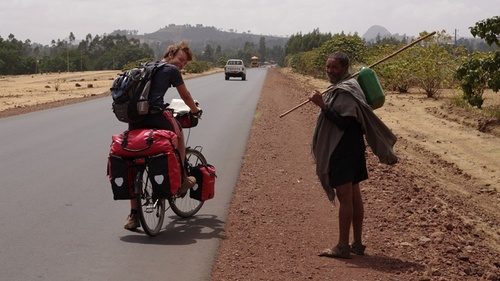
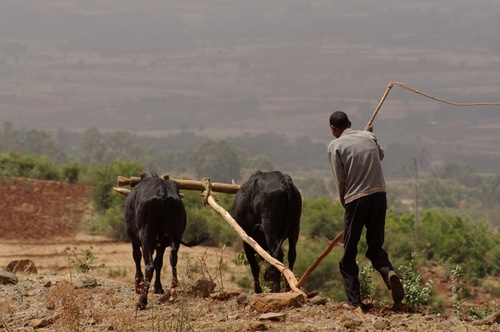
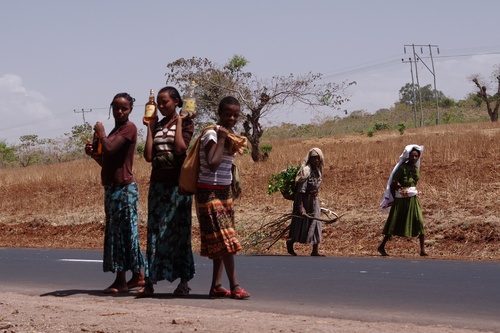
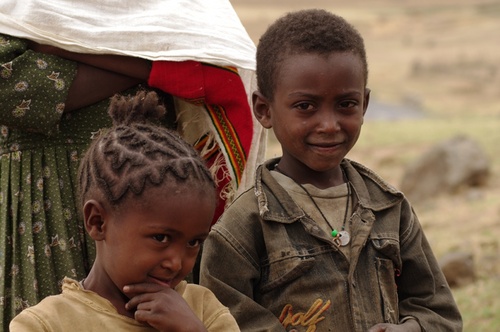
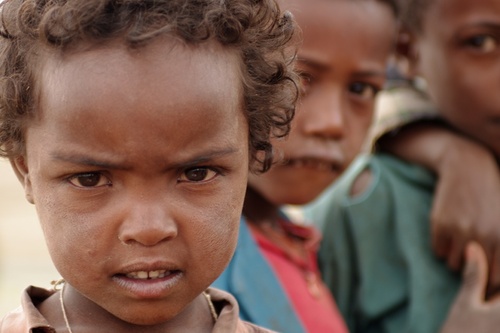
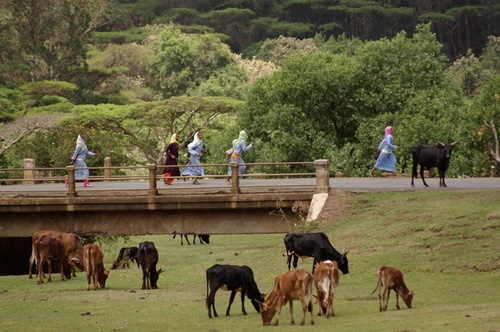
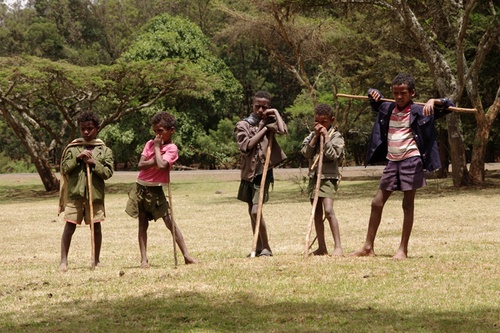
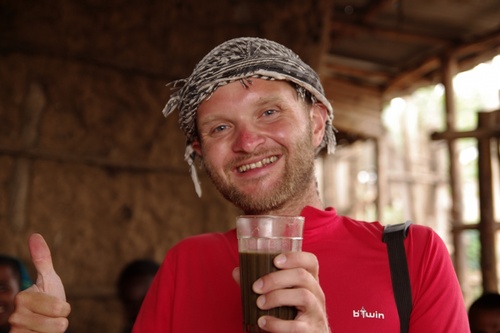
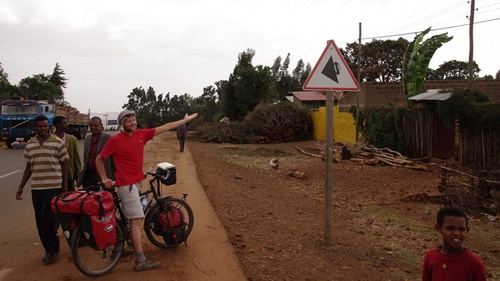
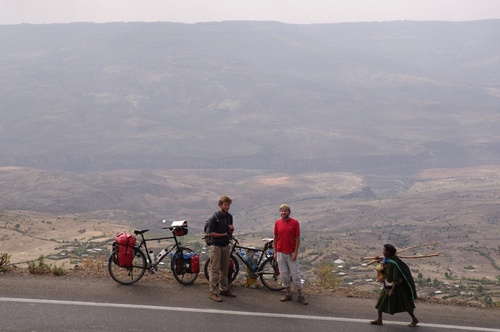
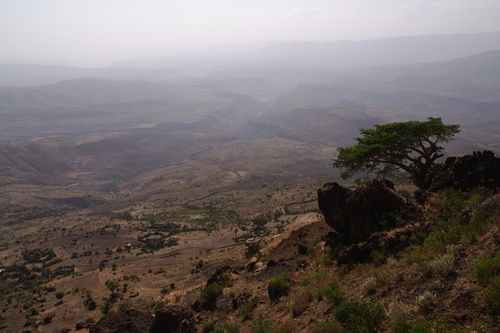
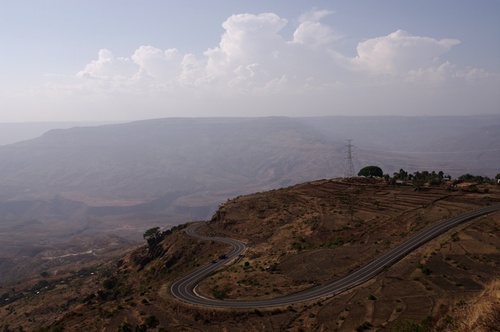
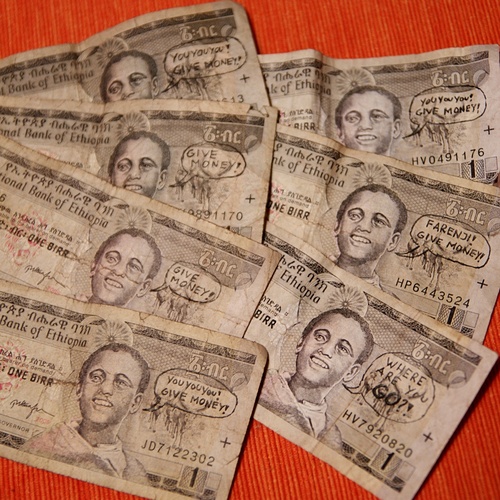
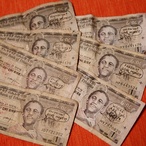
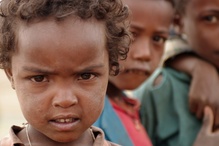
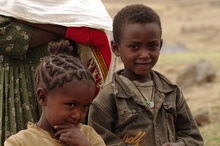
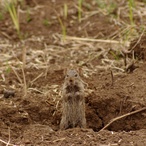
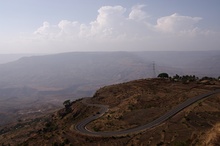
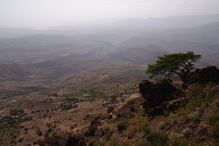
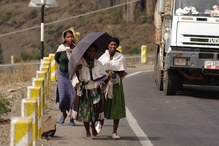
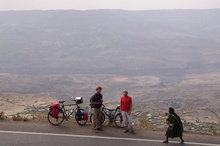
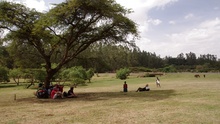
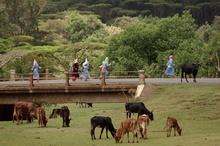
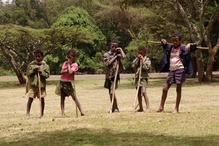
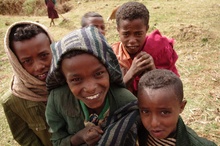
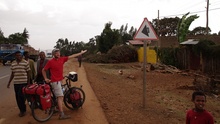
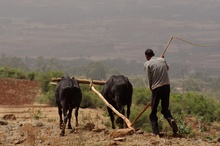
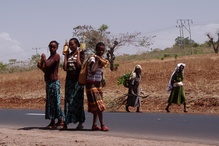
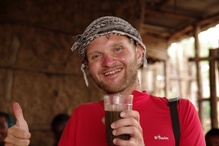
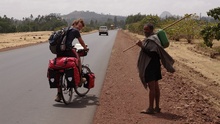
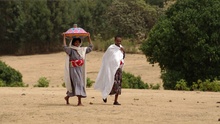
Comments:
tranquilo
Karol
OK. Zaczynam czytać tam gdzie skończyłem, czyli jak przystawiali ci lufę.
Almon
Vito
Rob
Kylie
Good luck on your travels!
Ciao,
Kylie
James
"English is obligatory since the early years of education, and despite the huge deficiencies of schools and teachers’ skills, some kids were able to assemble simple sentences. Unfortunately, the words they had mastered the best were “money” and “give”."
You do realize that you were cycling through one of the world's poorest countries, with average income of about 10% of the one of CUBA, and a literacy rate well under 50%, don't you? It kind of sounds like you cycled through Ethiopia staying at 1.5 USD hotels but expecting people to be able to speak English with you. The main concern of most people in this country is how to have enough to eat today and tomorrow!